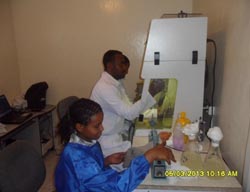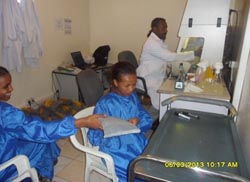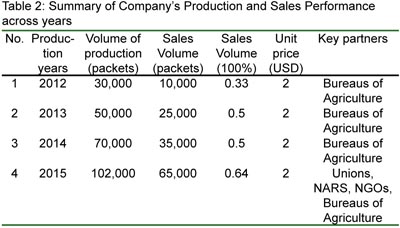Introduction
Menagesha Biotech Industry (MBI) is a private bio fertilizer producing company established in 2012 with the objective of producing and distributing bio-fertilizers and long run vision of becoming the leading bio-fertilizer producing industry in the region.
The production capacity of the company was slightly increasing across years from 30,000 packets (125 grams each enough for quarter hectare) of inoculant in 2012 to 50,000, 70,000, and 102,000 packets in 2013, 2014 and 2015, respectively. Even though the production capacity of the plant was getting improved across cropping seasons since its establishment, MBI has faced different challenges including limited awareness and use of bio-fertilizers by smallholder farmers, lack of effective input demand information, inefficient distribution infrastructure, and poor business linkage all contributing to poor sales performance of the company.
 |
 |
Inoculant Production Process at MBI Unit |
As a penetration strategy to the inoculant business, the company has been supplying inoculants for a minimum steady price and also in the form of credit where defaulting was a key challenge. The Ministry of Agriculture at federal level and Bureaus of Agriculture at regional, zonal and district levels were approached to be a bridge between the company and smallholder famers. Although the ministry and bureaus of agriculture do promote inoculants knowing its immense contribution to soil health, yield increments and affordability by pro-poor famers, the model was finally observed to be inefficient and unsustainable.
The PPP Approach-The New Inoculant Business Model
|
The International Livestock Research Institute’s (ILRI’s) "Putting Nitrogen Fixation to Work for Smallholder Farmers in Africa" (N2Africa) Project’s initiative to create an efficient and sustainable inoculant business through the "Public-Private Partnerships" has been working with the company and made a business relationship Farmers’ Cooperative Unions. |
|
The rationale to use the Farmers’ Cooperative Unions as an entry were: 1) the unions are business entities mandated by the government, 2) unions are good means to reach more number of farmers, 3) unions work hand in hand with bureaus of agriculture in forecasting input demands and, 4) it is easier to bulk grain products and deliver back to buyers through the unions and 5) it is easier to link farmers to better grain markets (which has been a good driver to buy inoculants and adopt legume technologies) via unions.
|
This partnership approach (PPP) has put forward the inoculant business and the company has witnessed a huge inoculant demand, better collaboration from stakeholders and an improvement in sales. After almost same sales records for the last two years (2013-2014) as compared to production, a general estimation of 10% sales increment has been attributed to partnership for 2015. |
|
The partnership is designed in such a way that there will be a business and technical support coming from other legume value chain actors including the public research and extension (research institutes, universities, and bureaus of agriculture), development partners, and the private actors to the smallholder farmers (the inoculant buyers) with a multiplier effect to the inoculant business.
Dejene Woldemariam (MSc), MBI Chief Executive Officer and Asnake Beshah (MSc), MBI Senior Production Technologist, Menagesha Biotech Industry, Addis Ababa


